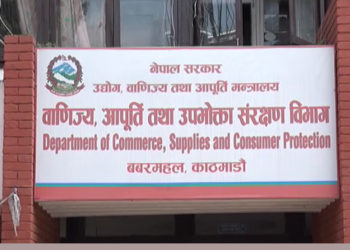KATHMANDU: Israel is continuously attacking Lebanon by air and land, resulting in numerous civilian casualties from airstrikes in Beirut, the capital of Lebanon.
The Lebanese government has reported that at least 1.2 million people have fled since tensions with Israel escalated last year.
On October 8, 2023, Hezbollah launched a rocket attack on northern Israel, following Hamas’s attack on Israel a day earlier, which resulted in 1,200 deaths and 251 kidnappings.
The conflict that ignited from these encounters is currently in full swing.
In the latest phase, Israel has escalated its attacks on Lebanon, including assaults on the United Nations peacekeepers stationed there to maintain stability.
The United Nations Security Council has expressed serious concern over Israel’s attacks on the United Nations Interim Force in Lebanon (UNIFIL), which is deployed in South Lebanon to uphold peace.
Spain contributes 676 troops, France has 673, and China has 418 peacekeepers in Lebanon. Ireland has 370 personnel, South Korea has 294, and Poland has sent 213.
Reports from international media outlet Al Jazeera indicate that five members of UNIFIL were injured in these attacks.
In response, Italy, Britain, France, and Germany issued a joint statement condemning Israel’s actions against peacekeepers, emphasizing that deliberate attacks on such forces violate international law.
However, Israeli Prime Minister Benjamin Netanyahu has denied these allegations, asserting that the UN Interim Force should “immediately leave the war zone.”
UN Secretary-General Antonio Guterres’s spokesman, Stephane Dujarric, stated that the attack on the peacekeeping force is a violation of international law and constitutes a war crime.
Guterres has urged Israel to refrain from any actions that could jeopardize the safety of peacekeeping forces in Lebanon.
What is the ‘United Nations Interim Force’?
The United Nations Interim Force in Lebanon (UNIFIL) has been operating in Lebanon for nearly 50 years to maintain peace.
This 10,000-member force from 50 different counties patrols the border between Lebanon and Israel as part of its peacekeeping mission.
Established by the United Nations Security Council on March 19, 1978, UNIFIL was created in response to Israel’s invasion of Lebanon.
The Security Council initially passed Resolutions 425 and 426, calling for Israel’s withdrawal from Lebanon and the establishment of UNIFIL to achieve three main objectives:
Confirm the withdrawal of Israeli forces.
Restore international peace and security.
Assist the Lebanese government in reestablishing its effective authority.
Tensions on the Israel-Lebanon border escalated in the early 1970s with the entry of Palestinian armed groups into Lebanon from Jordan.
As Palestinian commando operations against Israel intensified, so did Israeli retaliatory strikes on Palestinian bases in Lebanon.
After an attack on Israel on March 11, 1978, attributed to the Palestine Liberation Organization (PLO), the Israeli military launched a counterattack on March 14-15, quickly occupying southern Lebanon.
On March 15, 1978, the Lebanese government protested the Israeli invasion to the United Nations Security Council, claiming no connection to the Palestinian operations.
On March 19, the Security Council passed Resolutions 425 and 426, demanding an immediate ceasefire and withdrawal of Israeli forces from Lebanese territory. Consequently, UNIFIL troops arrived in Lebanon on March 23, 1978, to help maintain peace in the region.
Are they soldiers?
Peacekeepers deployed in various countries are not considered soldiers in the traditional sense; they serve only their homeland’s military.
Troops engaged in peacekeeping missions do not participate in warfare and are expected to maintain impartiality.
According to the United Nations, peacekeeping operations not only help maintain peace and security but also support the political processes of the host country.
They protect civilians, assist in disarming and reintegrating former combatants, facilitate elections, safeguard human rights, and help restore the rule of law.
The United Nations Interim Force comprises more than 10,000 peacekeepers from 50 countries, including Nepal.
As reported by Al Jazeera, the largest contingent comes from Indonesia. Nepal ranks fourth in terms of the number of peacekeepers sent to Lebanon, with Italy and India in second and third place, respectively.
Specifically, Indonesia has deployed 1,231 peacekeepers, Italy has sent 1,068, India has contributed 903, and Nepal has 876 troops stationed in the region.
Countries like Armenia, the United Kingdom, Colombia, Croatia, Estonia, Fiji, Kazakhstan, Malawi, the Netherlands, Nigeria, Peru, Qatar, and Uruguay each have one peacekeeper stationed in Lebanon.
In addition to these countries, Ghana has sent 873 peacekeepers, while Malaysia has 833.
Spain contributes 676 troops, France has 673, and China has 418 peacekeepers in Lebanon. Ireland has 370 personnel, South Korea has 294, and Poland has sent 213.
Other contributing nations include Finland with 205, Cambodia with 185, Serbia with 182, Austria with 165, Greece with 131, and Sri Lanka with 126.
Bangladesh has sent 125 peacekeepers, Germany has 112, Turkey has 92, and El Salvador has 52. Moldova contributes 32, Brunei has sent 29, and Hungary has 15.
Brazil has deployed 11, Malta has 9, North Macedonia has 5, and Mongolia has 4 peacekeepers.
Al Jazeera also notes that smaller contingents are present from Argentina, Kenya, Latvia, and Sierra Leone, each contributing three peacekeepers, while Cyprus, Guatemala, and Zambia have sent two each.
Countries like Armenia, the United Kingdom, Colombia, Croatia, Estonia, Fiji, Kazakhstan, Malawi, the Netherlands, Nigeria, Peru, Qatar, and Uruguay each have one peacekeeper stationed in Lebanon.
This diverse representation underscores the international commitment to peacekeeping efforts in the region.









Comment